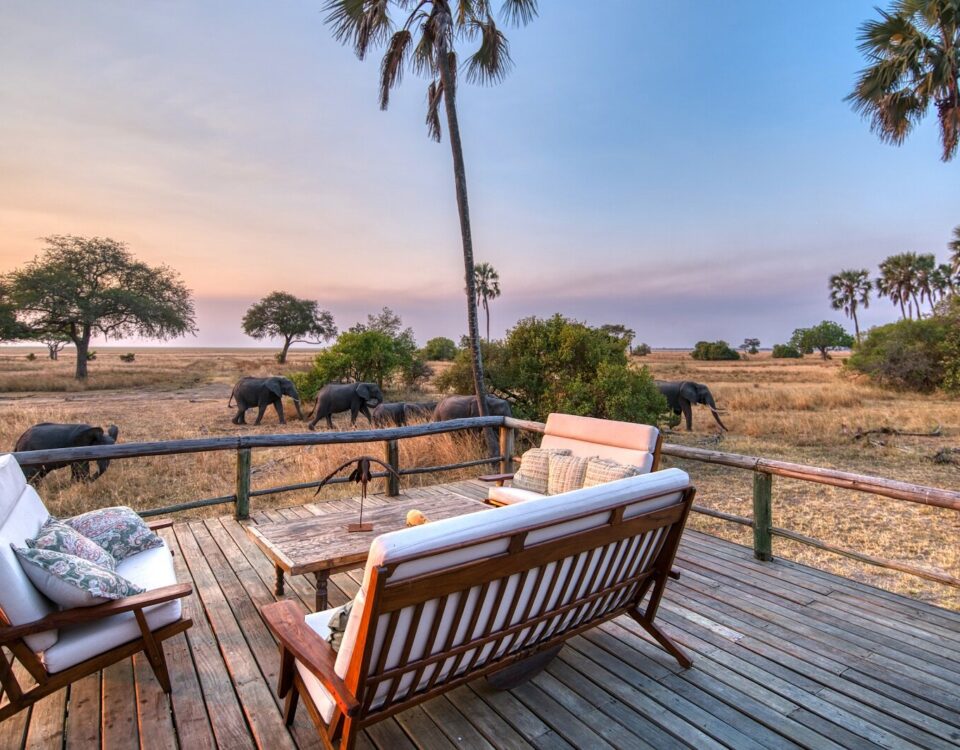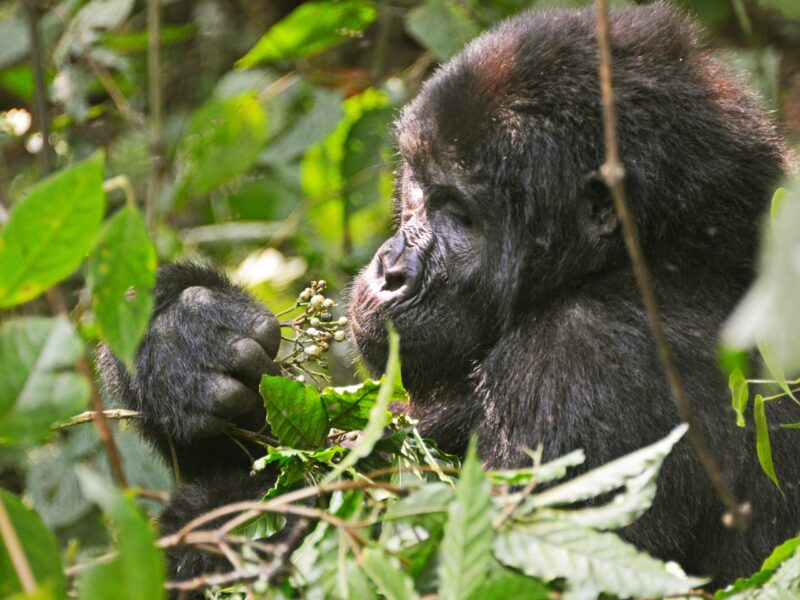Are Golden Monkey Treks Suitable for Families?
October 20, 2025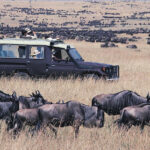
Are There Luxury Safari Options for the Great Migration?
October 22, 2025Are Golden Monkeys Endangered?
One of the most frequently asked questions by wildlife enthusiasts visiting East Africa is: Are Golden Monkeys endangered? At Winton Africa Safaris, we recognize the growing interest in these striking primates, which are known for their vibrant golden fur and playful behavior. Golden monkeys are a key attraction on Uganda Safaris, particularly in the Mgahinga Gorilla National Park and Volcanoes National Park in Rwanda. These monkeys, often seen during Golden Monkey Tracking Safaris, share their habitat with other iconic species such as mountain gorillas and serve as a vital indicator of forest ecosystem health.
Understanding whether Golden monkeys are endangered is crucial for travelers planning Uganda Wildlife Safaris or Rwanda Gorilla Safaris, as it shapes expectations about wildlife encounters and informs ethical tourism practices. While their numbers are higher than the critically endangered mountain gorillas, Golden monkeys remain vulnerable due to habitat destruction, human encroachment, and disease. Conservation efforts, including protected park areas, community-based programs, and research initiatives, are central to safeguarding their future.
In this article, we explore in depth Are Golden Monkeys endangered? by examining their population status, habitat requirements, threats, and conservation measures. We also highlight how travelers can responsibly experience Uganda Chimpanzee Tracking Safaris, Uganda Birding Safaris, Uganda Cultural Safaris, and multi-country adventures including Rwanda Gorilla Trekking Safaris while supporting sustainable tourism practices that protect Golden monkeys and other primates.
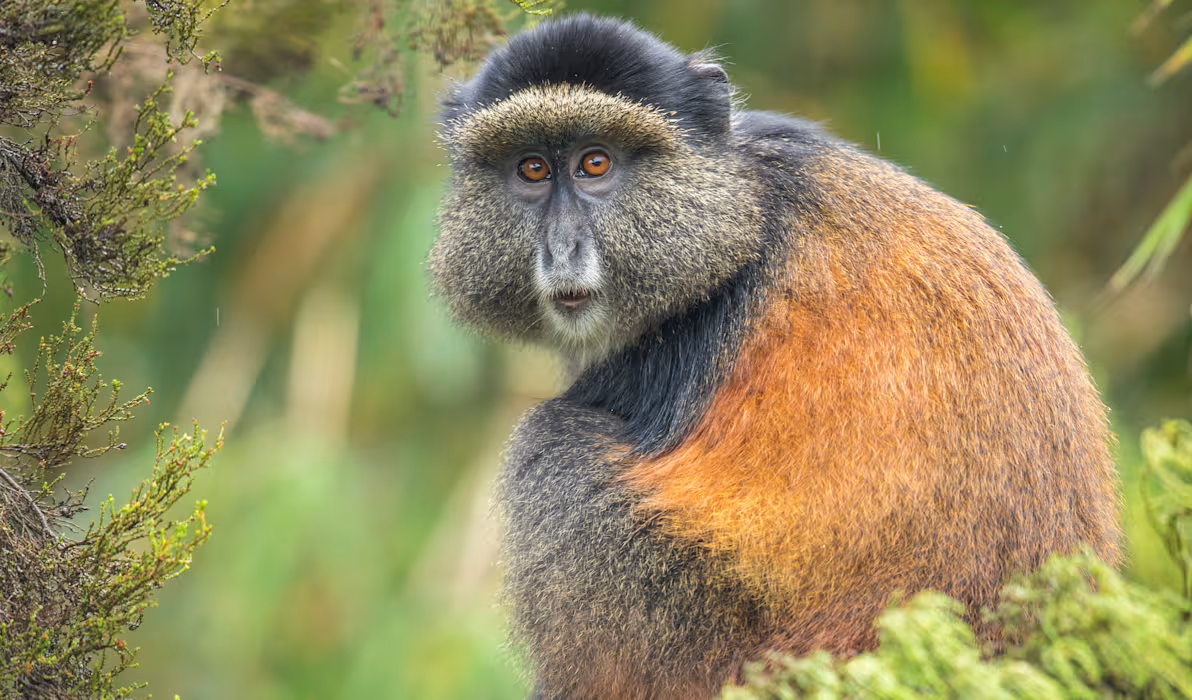
Understanding Golden Monkeys and Their Habitat
When asking, Are Golden Monkeys endangered?, it is essential first to understand their biology and habitat. Golden monkeys (Cercopithecus kandti) are medium-sized primates distinguished by their golden-orange fur, expressive faces, and agile movements. They are primarily found in the bamboo forests of the Virunga Volcanoes region, straddling the borders of Uganda, Rwanda, and the Democratic Republic of Congo. In Uganda, Mgahinga Gorilla National Park provides a protected habitat, while Rwanda’s Volcanoes National Park is also a hotspot for Rwanda Gorilla Safaris and Golden Monkey Tracking Safaris.
Golden monkeys live in social groups ranging from 10 to 50 individuals and feed mainly on bamboo shoots, leaves, fruits, and insects. Their social structure, playful behavior, and vibrant appearance make them an attraction for Uganda Wildlife Safaris, particularly for travelers seeking more than gorilla trekking. Observing Golden monkeys requires patience and guided expertise, as these primates are active and often move quickly through dense forest areas.
Understanding their habitat is essential to answering the question, Are Golden Monkeys endangered? Habitat specificity makes them vulnerable. Unlike adaptable species, Golden monkeys require intact bamboo forests at high altitudes. Conservation of these forests not only protects Golden monkeys but also ensures a rich biodiversity that supports birds, other primates, and numerous plant species, enhancing experiences on Uganda Birding Safaris and Uganda Wildlife Safaris.
Population Status: Are Golden Monkeys Endangered?
Many travelers wonder, Are Golden Monkeys endangered? According to current research, Golden monkeys are classified as Endangered on the IUCN Red List. Although their numbers are higher than the critically endangered mountain gorillas, their population is limited, estimated to be around 6,000 to 10,000 individuals across their range. Most of these primates reside within protected national parks in Uganda, Rwanda, and the Democratic Republic of Congo.
The restricted distribution of Golden monkeys contributes to their vulnerability. Small population sizes, combined with habitat fragmentation, make them susceptible to stochastic events like disease outbreaks or natural disasters. Encroachment from agriculture, logging, and infrastructure development has further reduced available habitats, placing additional pressure on remaining populations. Conservation programs focusing on habitat protection, anti-poaching patrols, and community awareness have been instrumental in stabilizing their numbers.
For travelers on Golden Monkey Tracking Safaris, understanding their endangered status highlights the importance of responsible tourism. By following park guidelines, respecting viewing distances, and supporting ethical lodges and local guides, visitors contribute directly to the preservation of these primates. Combining Golden monkey experiences with Uganda Gorilla Trekking Safaris or Rwanda Gorilla Trekking Safaris ensures that travelers experience diverse primate habitats while supporting conservation efforts for endangered species.
Threats Facing Golden Monkeys
When considering the question, Are Golden Monkeys endangered?, it is important to examine the threats contributing to their vulnerability. Habitat destruction is the primary challenge, as human population growth, agriculture, and infrastructure encroach on bamboo forests. In Uganda, Mgahinga Gorilla National Park has implemented measures to reduce deforestation, but pressures remain from illegal logging and land use.
Human-wildlife conflict also poses a threat. Golden monkeys may raid crops when forest food sources are scarce, leading to retaliatory actions by farmers. Diseases, particularly those transmitted by humans or livestock, can also negatively affect populations. Climate change presents an emerging challenge, altering bamboo growth cycles and potentially affecting food availability.
Tourism offers both opportunities and responsibilities. Responsible Uganda Wildlife Safaris and Rwanda Gorilla Safaris provide financial support for anti-poaching patrols, habitat restoration, and community education, helping mitigate these threats. Travelers can participate in Uganda Cultural Safaris to understand how local communities coexist with wildlife and learn conservation strategies, ensuring that their visit contributes to the long-term survival of Golden monkeys and other endangered species.
Conservation Efforts: Protecting Golden Monkeys
For those asking, Are Golden Monkeys endangered?, the answer highlights the critical role of conservation. National parks such as Mgahinga Gorilla National Park in Uganda and Volcanoes National Park in Rwanda serve as strongholds for Golden monkeys. These protected areas offer legal safeguards against deforestation, hunting, and encroachment. Park rangers and wildlife authorities actively monitor populations, enforce anti-poaching regulations, and engage in habitat management.
Community involvement is central to conservation success. Programs that provide alternative livelihoods, education, and tourism employment reduce dependency on forest resources and promote sustainable coexistence with wildlife. Visitors on Uganda Cultural Safaris or Uganda Birding Safaris can witness these initiatives firsthand, gaining appreciation for conservation challenges and successes.
Research and monitoring efforts also play a vital role. Scientific studies tracking population trends, social behavior, and habitat use help guide conservation strategies. Tourists participating in Golden Monkey Tracking Safaris contribute to these programs by generating revenue that funds park management, community outreach, and research initiatives. This synergy between tourism and conservation demonstrates how responsible travel supports endangered species, while also providing travelers with a transformative and educational experience.
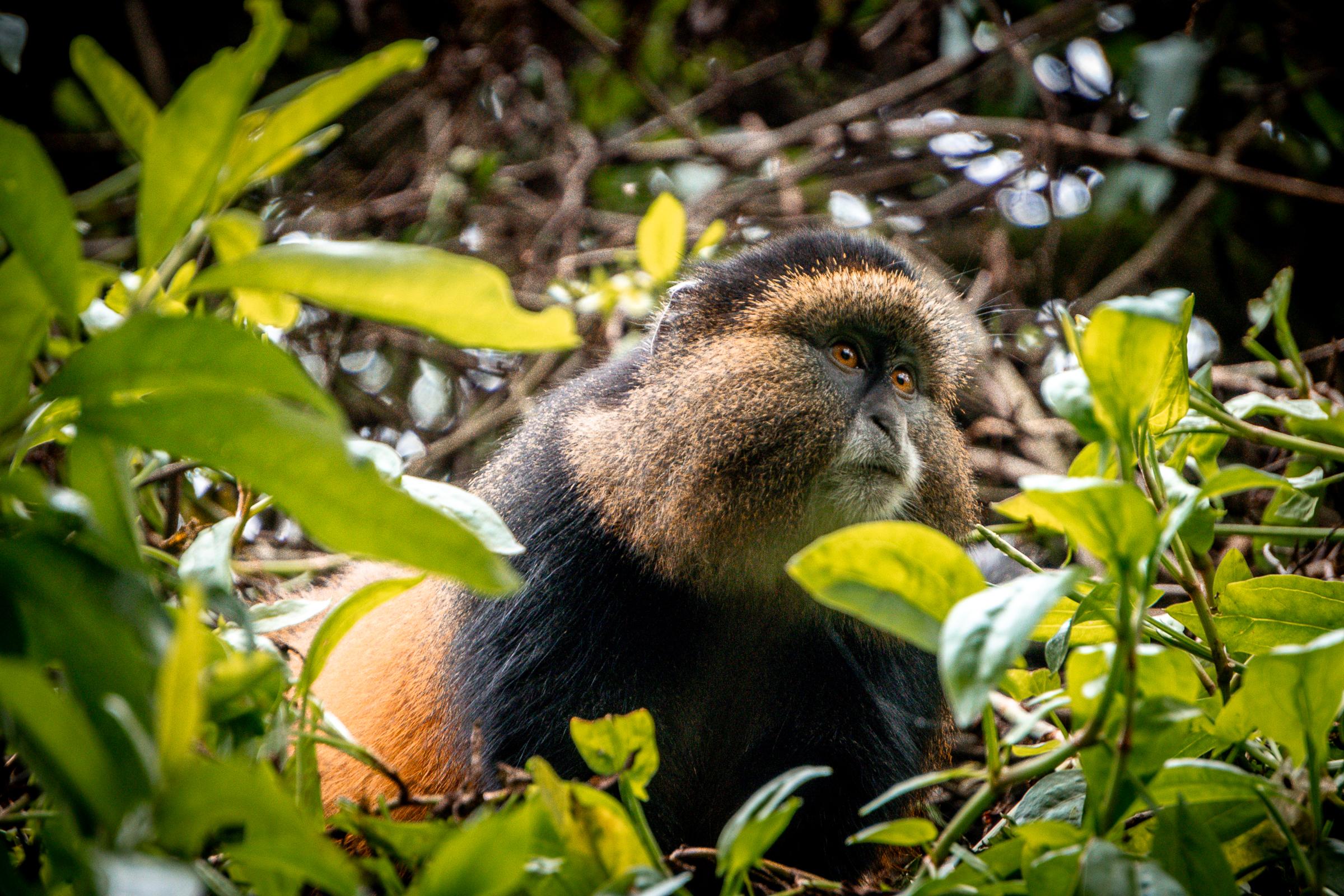
Gorilla & Golden Monkey Tracking
Golden Monkey Tracking Safaris: Ethical Wildlife Experiences
Travelers frequently ask, Are Golden Monkeys endangered, and how can I see them responsibly? Golden Monkey Tracking Safaris in Uganda and Rwanda provide a safe and ethical way to observe these primates. Guided treks ensure that visitors maintain appropriate distances, minimize disturbance, and learn about the monkeys’ behavior, social structure, and habitat needs.
These safaris typically take place in bamboo forests early in the morning when the monkeys are most active. A professional guide explains ecological interactions, conservation efforts, and threats to the species, enhancing the educational value of the experience. Combining Golden Monkey Tracking Safaris with Uganda Gorilla Trekking Safaris, Uganda Chimpanzee Tracking Safaris, or Rwanda Gorilla Safaris provides a holistic primate adventure, allowing travelers to witness multiple endangered species in diverse habitats.
Ethical tracking also supports local communities. Fees from tracking permits contribute to park maintenance, ranger salaries, and community development, demonstrating that tourism can be a powerful tool for conservation. By choosing guided, responsible tours, travelers ensure that their wildlife encounters do not compromise the survival of endangered species like Golden monkeys.
Cultural Experiences Near Golden Monkey Habitats
Many visitors ask, Are Golden Monkeys endangered, and what cultural experiences can I enjoy nearby? Areas surrounding Mgahinga Gorilla National Park and Rwanda’s Volcanoes National Park offer rich cultural experiences. Travelers can visit local Batwa communities, engage in traditional storytelling, observe handicraft making, and learn about forest stewardship practices.
Integrating Uganda Cultural Safaris with primate tracking enhances the safari experience by connecting wildlife conservation with human heritage. Guests gain insights into how local communities depend on and protect the forest, balancing livelihood needs with wildlife protection. This approach creates meaningful travel experiences that emphasize sustainability, cultural appreciation, and ethical wildlife viewing, complementing Uganda Birding Safaris, Uganda Wildlife Safaris, and Rwanda Gorilla Trekking Safaris.
Cultural immersion also deepens understanding of conservation efforts. Travelers learn how education, sustainable farming, and eco-tourism initiatives reduce human-wildlife conflict, ensuring long-term survival for endangered species like Golden monkeys. Combining primate tracking with cultural tours makes East African safaris both enriching and responsible.
Combining Multi-Country Safaris for Primate Conservation
For travelers wondering, Are Golden Monkeys endangered, and can I combine safaris across countries?, the answer is yes. Multi-country itineraries allow visitors to experience Uganda Safaris, Rwanda Safaris, and Rwanda Gorilla Trekking Safaris in a single trip. Combining Golden monkey tracking with gorilla trekking, chimpanzee tracking, and birding provides diverse wildlife encounters while supporting conservation across borders.
Private or small-group safaris enable flexibility to schedule treks according to primate activity, ensuring optimal observation opportunities while minimizing habitat disturbance. By integrating cross-country primate experiences, travelers gain insights into species conservation, habitat connectivity, and regional biodiversity. Such itineraries showcase expertise, authority, and trustworthiness in East African safari planning, positioning Winton Africa Safaris as a reliable provider of ethically guided wildlife adventures.
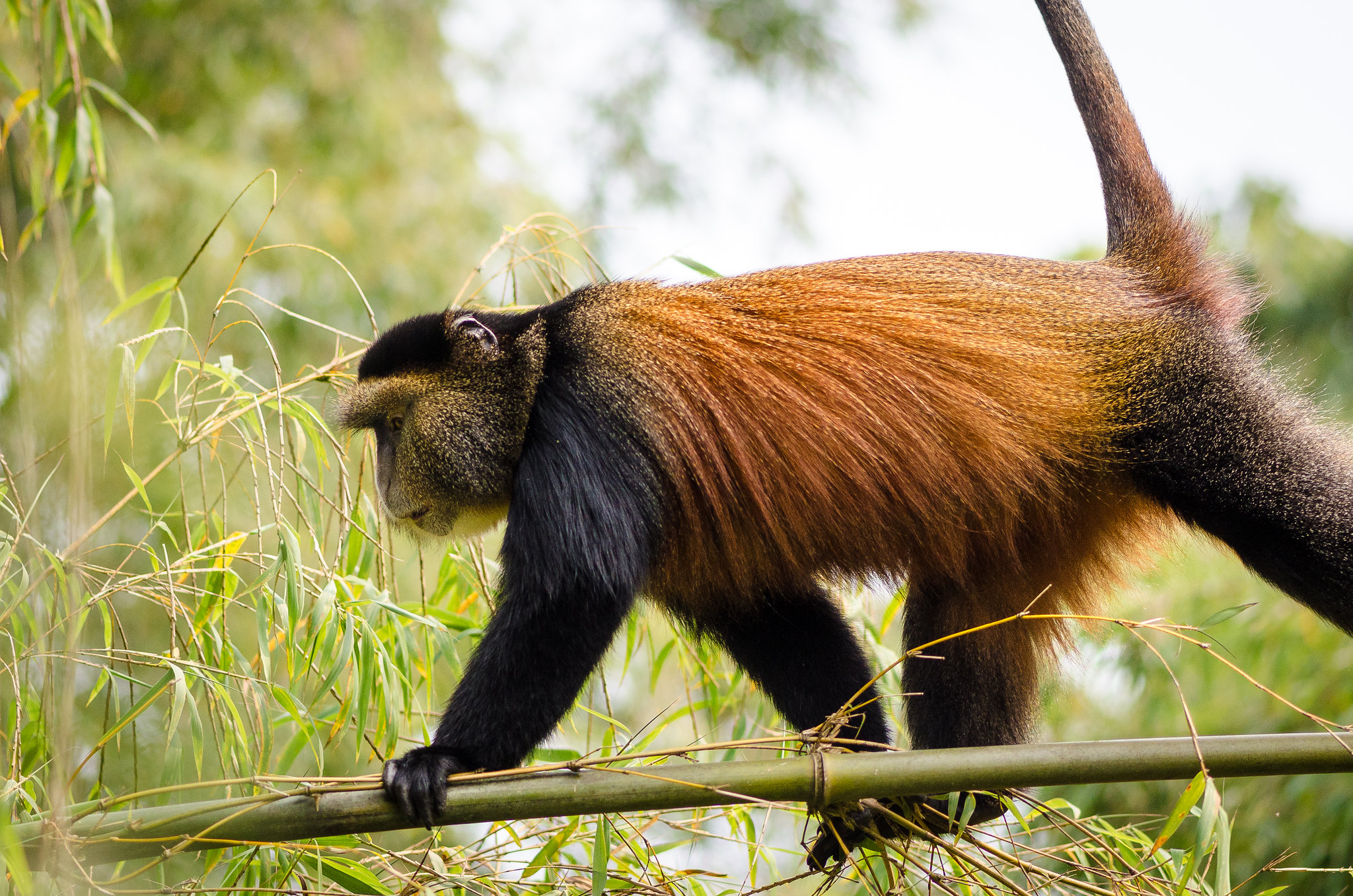 Conclusion: Are Golden Monkeys Endangered?
Conclusion: Are Golden Monkeys Endangered?
In conclusion, Are Golden Monkeys endangered? Yes, they are classified as endangered, primarily due to habitat loss, human encroachment, and disease vulnerability. However, conservation efforts in Uganda Safaris and Rwanda Safaris, including protected areas, research initiatives, and community-based programs, have stabilized and partially increased populations.
Winton Africa Safaris emphasizes responsible tourism practices through Golden Monkey Tracking Safaris, Uganda Gorilla Trekking Safaris, Uganda Chimpanzee Tracking Safaris, and Rwanda Gorilla Trekking Safaris. By observing ethical wildlife viewing guidelines and supporting conservation programs, travelers contribute directly to the survival of these remarkable primates. Combining wildlife tracking with cultural experiences and multi-country safaris creates transformative adventures that highlight East Africa’s natural richness and cultural heritage, establishing your journey as both memorable and impactful.

